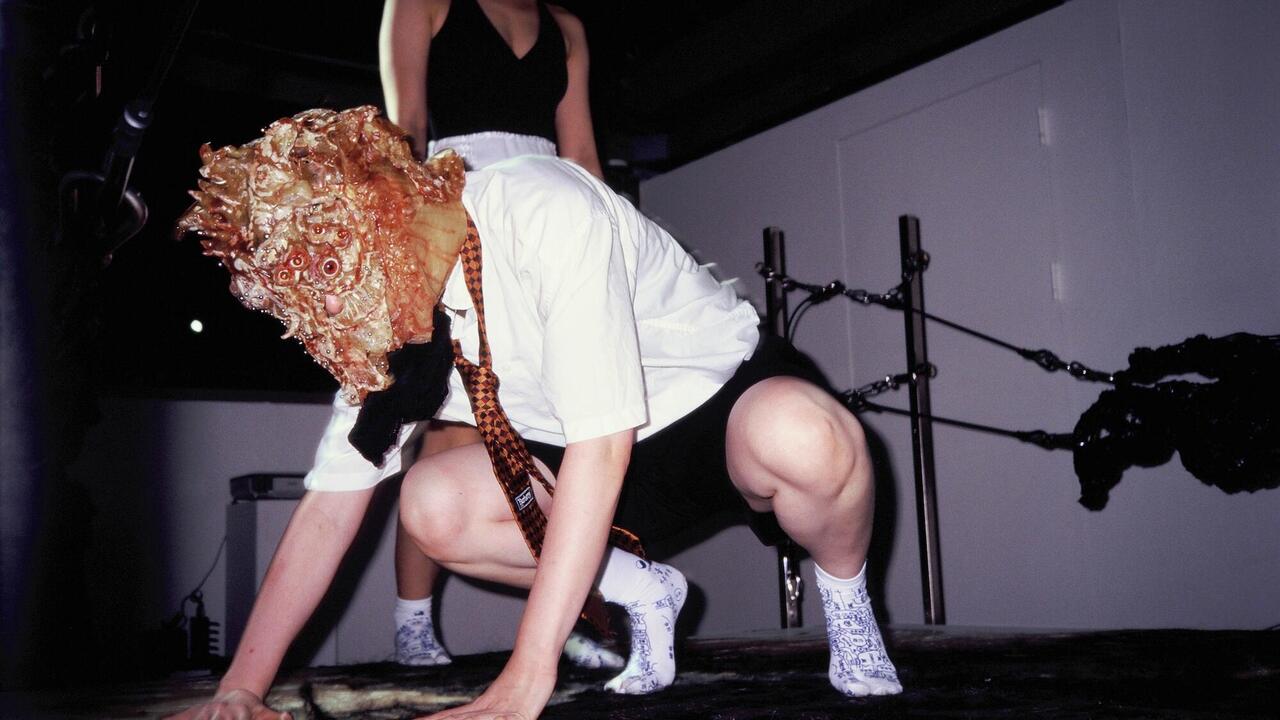The Blackmarket
An installation with 100 experts: Hannah Hurtzig’s touring project comes to Mannheim, Germany
An installation with 100 experts: Hannah Hurtzig’s touring project comes to Mannheim, Germany
The Blackmarket for Useful Knowledge and Non-Knowledge was described to me as the ‘speed dating of esoteric wisdom’ – an unfortunate analogy, in that it fits well though suggests a much less sexy affair. The event is structured so that visitors can book a 30-minute session with an expert of their choice, visiting a range of people and topics over the course of an evening. Hannah Hurtzig, the Berlin-based curator and dramaturge who began organizing the Blackmarket in 2005, calls it an ‘installation with over 100 experts’ – though the number varies as it travels. Working under the auspices of the Mobile Akademie, Hurtzig and her collaborators identify local experts according to a vaguely site-specific theme: Vienna’s last year was ‘Guilt’; this autumn Jaffa’s will be ‘Invisible and Ghostly Knowledge’; Mannheim’s, which I attended last month during the International Schiller Days, was titled ‘Games People Play’ – both a tribute to one of the central elements in the philosopher’s thought, and a pun on the context of a theatre festival.

The foyer at the Liverpool edition, November 2008. Photograph: Alex Wolkowicz
Entering the lobby of the Nationaltheater an hour before the conversations are billed to start, I found the Blackmarket – or at least the market part – in full swing. Four very high ticket booths had been set up; coiffed and enameled ticket-sellers sat inside. The queues didn’t move quickly, which meant there was plenty of time to study the offerings; the theme hardly seemed to have constrained the variety of expertise on offer: round one promised an appointment on ‘Striving Playfully for the Meaning of Life’ with the dean of the city’s evangelical church, and a taxi driver and trade unionist on ‘The Wonderful World of Wordgames’ – though at the Blackmarket, as in life, experts seemed to proliferate in the vicinity of sex, politics and academia. You could queue in the UTOPIA line for a chat with the regional chairman of satirical right-wing political party Die PARTEI, on ‘Visions for Germany: Why We Need Another Wall’, though it was best not to get too attached to your selection, as it was likely that someone ahead of you would take it, and you might wind up with an expert on ‘Why in the future we will not drive cars and why adults will have to find themselves a new toy’ (not satirical). Each booth offered tickets according to its own cryptic category – and the tellers are instructed to sell you an appointment, whether or not it’s the one you wanted.

From the Berlin edition of the Blackmarket in March 2007. Photograph: Fabian Larsson
The Kasse frustrated, but the interior of the theatre gratified: the space felt as though it had been outfitted for a casino game either long-forgotten or yet-to-be-invented. In the centre of the room, green-topped tables were arranged in a grid; risers surrounded the game floor on four sides. The person sitting in front of me, apparently a specialist on ‘Identity Games’, introduced herself as Sophie. As it turned out, Sophie was an artist – and the one-Euro ‘symbolic fee’ I had paid for the appointment got me a personalized explanation of a project she had done a few years ago on the streets of Mannheim. The project, it seemed to me, was saved by the artist’s own interpretation of it – it was hard not to warm to Sophie’s engagement. For a while I tried to figure out what made her an expert on identity generally, to establish whether she had any transferable identity-related insights, but I got nowhere, so gave up gladly enough.

Since it is impossible, at least through the Blackmarket’s official channels, to book two expert-sessions in a row, conversationalists tend to cycle into the risers for the next round. There, everyone had headphones and what looked like cheque-books. You could tune in to one of five conversations that were underway – the little books contained maps, which were supposed to help you locate them. But again, it didn’t turn out to be so simple: with 100 talks going on, there was always a mismatch between what you could hear and what you could see – and for that matter what you could understand. Obstruction and derailment are part of Hurtzig’s strategy; what being allowed to hear five conversations really does is to make you more intrigued by the 95 that you can’t.
Sitting in the dark, I preferred being a spectator to being a participant, though it’s clear that having just negotiated this curious 30-minute space had increased my voyeuristic stake. Equally, returning to the game floor with a heightened sense that one may at any point, have a wider audience, makes playing the game more exciting – though the same is true of being in the audience: I found myself trying to follow what my fellow watchers were reacting to.
The crucial part that spectators play in animating the Blackmarket marks a significant difference with other participatory works. Hurtzig’s theatre background is clearly an important influence here, though a complex one. A good part of her career has been spent involved in a German tradition of experimental drama focused on upending theatre’s representative illusions. Groups like Rimini Protokoll engage the audience in unscripted conversations – not with actors but with call-centre employees and politicians; director René Pollesch has readers dash through scripts as quickly as possible, so as to short-circuit any possible empathic projection on the part of the listener (he is present at the Mannheim Blackmarket, offering sessions titled ‘Man is only truly human when he sings’). Berlin’s Volksbühne, where Hurtzig worked briefly, is known for assaulting theatrical illusions with real food and the illusion-sustaining capacity of the audience with extremely long performances. It’s no coincidence that the alienating Kasse is the element of the Blackmarket that most closely resembles a stage.
Hurtzig’s Blackmarket is uncommon among participatory art works in that it is conceived as a performance; but to leave it at that is imprecise. What makes the event distinctive in the art context is that it’s organized according to an uncommonly subtle appreciation of how performance figures in communication, in social interaction generally. Hurtzig doesn’t so much attack the theatrical conventions that mystify actors on stage, as manipulate them to redistribute the mystique more equitably.

Interior of the Vienna edition, May 2008. Photograph: Stefan Beer
At one end of the Nationaltheater was an enormous split screen showing the faces of two random participants side by side, shot in black and white on a slight time-lapse. As Hurtzig once noted in an interview, people for the most part have a sort of tender look about them when they’re listening, in order to signal that they are, in fact, listening. The scale of the screens makes one think of Braco Dimitrijević’s ‘Casual Passer-by’ series of headshots (1971), which, hung on public buildings, made their subjects appear as political candidates – here the effect is to make the listeners come off as leads in a Hollywood remake of a Nouvelle Vague classic.

From the Mannheim edition of the Blackmarket, July 2009. Photograph: Christian Kleiner
Is the Blackmarket best understood, then, in the terms of relational art or of avant-garde theatre? Perhaps choreography comes closest. The Blackmarket is essentially a strict formula of rules and conventions. It’s not as though the individuals involved don’t matter – on the contrary, rather that this structure collaborates with the event’s aesthetics to inflame one’s sense of the potential social interactions between them. It is the fact that the Blackmarket is fundamentally a code that allows Hurtzig to replicate the event anywhere – or even to ‘license’ it, as she has in Mannheim, so that it can be produced without her direction. The subtitle of this edition, ‘The attraction of rules, and the moment of their betrayal’, is significant. Cynically, one is tempted to speculate that what interests Hurtzig most is really the mysterious dynamics of rules and attraction; but these days in the art world, useful knowledge sells. Rather more generously, knowledge exchange seems to serve as an excellent pretext, equally for facilitating the individual encounters – flirtations, problematics, momentary bonds – and for the event as a whole.
The artist’s text for Mannheim notes that the Blackmarket ‘takes place in the theatre, the original place of public debate’, gesturing (as much recent discursive and pedagogical art has done) toward the notion that all these knowledge exchanges might somehow add up to a more critical public, even a less complacent citizenry – but I have my doubts. The Blackmarket makes it hard to distinguish knowledge from non-knowledge (it’s rare that one actually has much basis on which to evaluate, on, say, one’s first foray into ‘The Great Mannemer Dreck and Various Other Giant Cakes’); and it makes one more lax about distinguishing. The face-to-face intimacy of the exchanges hardly sharpens one’s critical faculties, if anything, it encourages one to suspend them. And the transformation that happens inside the theatre doesn’t seem apt to sustain any lasting effect; the enchantment seems ephemeral, necessarily temporary – and that seems just fine.














